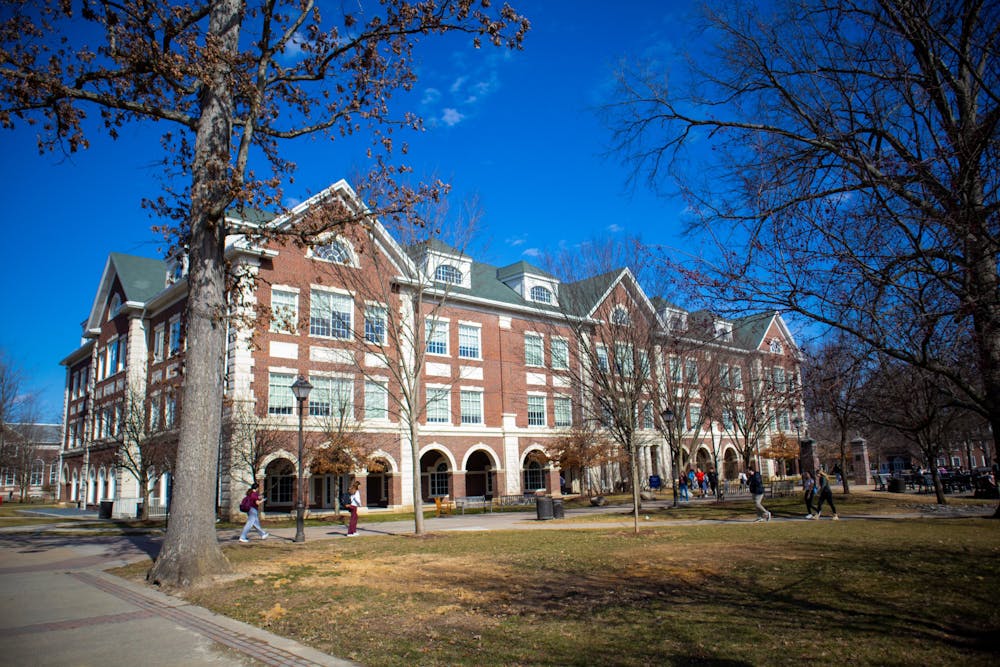By Matthew Kaufman
Managing Editor
LIONS Plan working groups are considering charging patrons for the cost of interlibrary loan services, implementing library “salary savings” and potentially opening a “spirit shop” in the library, according to the latest update sent to the campus from Interim President Michael Bernstein on April 9.
The working groups, which comprise faculty, staff and students, will report their final recommendations next month. Though the ideas outlined in the email are not finalized, Bernstein wrote that the content provides a “good preview of what will be reported in May.”
The suggestion that interlibrary loan services, which allow students, faculty and staff to request materials from other libraries, could no longer be free alarmed some students, including Kat Jorgensen, a senior English major who, along with David Roberts ‘23, brought the campus its two little libraries.
“Attending college already poses a significant financial barrier to low-income students,” Jorgensen told The Signal, “and to suggest that we should charge students for a service they require to succeed and have already funded through their tuition dollars is both unethical and inane.”
Further cuts to the library could come from a “reduction in acquisitions spending,” which Jorgensen said could reduce the amount of materials available in the College’s own library, thus increasing the need for interlibrary loans.
“If you claim to care about creating equal footing for students of all backgrounds, introducing monetary roadblocks will do us no good,” said Jorgensen. “These obstacles to library users will only further discourage usage and will negatively impact low-income students at a disproportionate rate.”
Two other cost-saving initiatives from the Faculty Responsibilities and Core Curriculum working group have been approved by the College Steering Committee, which makes them one step closer to final implementation. These include a reduction in the number of units required for graduation from 32 to 30 and eliminating the First-Year Writing program, instead incorporating its curriculum into First-Year Seminar classes. First-year language requirements will likely be altered, but it is still not clear what those changes could look like.
The group is also continuing to consider a reduction of adjunct professors, along with a suspension of the Support of Scholarly Activities program, which allows faculty members to have a reduced teaching load while participating in research or other professional activities.
Changes are also being considered to student life, including the implementation of differential housing, alternative health services and cuts to cable television offerings.
Bernstein noted that the LIONS plan does not exclude administrative offices, with these divisions also being examined for cost-saving opportunities.
“In my conversations with various members of the faculty, I have also heard of a desire to have the administrative side of our operations reviewed as part of the LIONS Plan process,” Bernstein said in the email. “It is, of course, entirely necessary and appropriate that the ‘non-academic side of the house’ be rigorously managed and efficiently deployed.”
The email also provided updates on the revenue-generating initiatives that are under consideration. The interim president said that the School of Continuing, Extended and Professional Studies working group has “completed a draft business plan for the school that outlines how it will achieve planned net revenue growth from $550,000 in FY26 to $4 million in FY28.”
Bernstein also said that a robust “TCNJ Online” platform will be developed in the first year to enable online education for graduate and continuing education courses, along with nontraditional undergraduates.
The Three-Year Bachelor’s Programs working group is developing two models for three-year degrees: one that would include summer, winter and transfer credits, and another that would include three years of classes and one year in a co-op experience, according to the email.
Finally, the Community College Partnerships working group is examining ways to strengthen relationships with both in-state and out-of-state community colleges, with possible initiatives including dual admissions policies, transfer credit agreements, housing community college students in College-owned facilities and hosting community college classes on campus.
Bernstein expressed an optimistic tone in his message, saying that the recommendations from the working groups will help to ensure the College’s long-term sustainability.
“In the weeks and months ahead, I have no doubt we will reap enormous benefits, both short-term and long-term, from all these efforts,” Bernstein concluded. “All our efforts will attract a broader and more diverse array of learners, ensuring they will benefit from the excellence that is a TCNJ education.”







